Introduction
Losing 20 pounds can be a transformative journey, unlocking a myriad of health benefits that extend far beyond the scale. As individuals embark on this path, understanding the importance of:
- Setting realistic goals
- Adopting effective strategies
- Nurturing a positive mindset
becomes essential. With nearly half of Americans feeling the pressure to achieve their ideal body, it’s crucial to approach weight loss with a comprehensive plan that emphasizes sustainability and support.
From balanced nutrition and regular exercise to the psychological aspects of weight management, this article delves into the multifaceted approach needed to foster lasting change. By prioritizing well-being and embracing a culture of health, individuals can not only achieve their weight loss goals but also enhance their overall quality of life.
Setting Realistic Goals for Losing 20 Pounds
When aiming to lose 20 pounds, it is crucial to set a realistic timeline to determine how long does it realistically take to lose 20 pounds. Health specialists advise a secure and sustainable rate of reduction at 1 to 2 pounds per week, which leads to the question of how long does it realistically take to lose 20 pounds, equating to roughly 10 to 20 weeks to achieve your objective. This method is supported by a staggering statistic: 88.3% of adults who have attempted to lose pounds reported using two or more strategies, highlighting the importance of a comprehensive approach.
In a society where 42% of Americans feel pressured to get fit for summer—especially 71% of Gen Zers aged 18 to 25—it’s vital to approach loss with patience and a well-structured plan. Notably, 19% of baby boomers ages 57 to 76 also feel the pressure to achieve a beach body, underscoring the widespread nature of these concerns. Furthermore, with 35.4% of South Carolinians facing obesity, effective management strategies for body mass are more crucial than ever.
Think about dividing your broad objective into smaller, achievable milestones—like losing 5 pounds monthly—with the assistance of skilled coaches who offer personalized guidance and evidence-based techniques. As one of our clients stated, 'The personalized coaching I received made all the difference in my journey to a healthier body; I felt supported every step of the way.' This not only maintains motivation but also allows for tracking progress effectively.
Remember, consistency is your ally on this journey, and small victories can lead to monumental achievements. In reality, a recent case study disclosed that 72% of surveyed doctors indicated insufficient training to tackle obesity concerns effectively, highlighting the necessity for enhanced assistance in managing body mass. By prioritizing personalized coaching, you can empower your team to take control of their health and well-being, fostering a healthier workplace environment.
Contact us today to learn more about how our coaching services can help you and your team thrive!
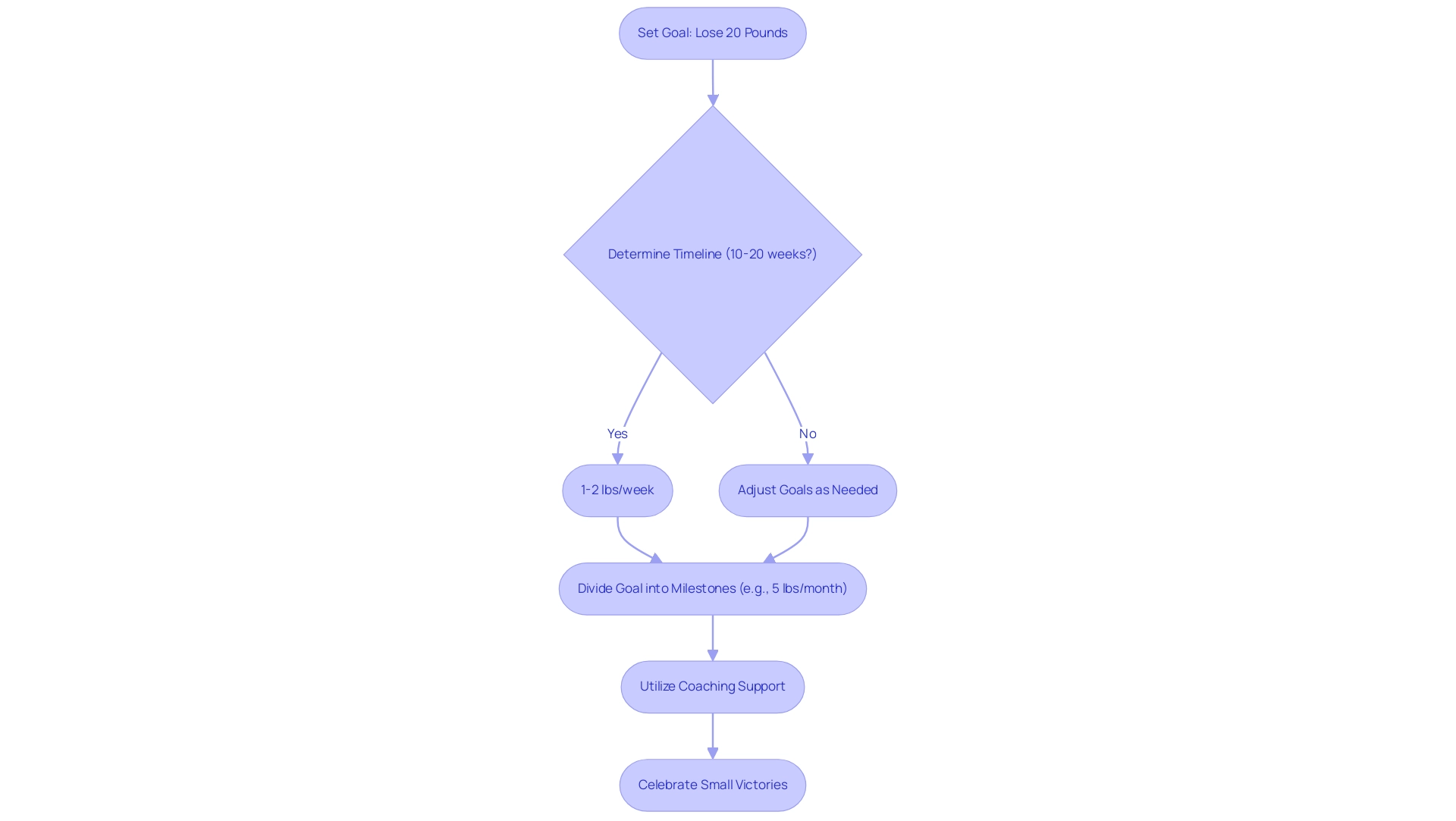
Effective Strategies for Losing 20 Pounds Safely and Sustainably
With the appropriate strategies and assistance from Foresight Health Coaching, one may wonder how long does it realistically take to lose 20 pounds in a safe and sustainable manner within a month. Here are effective approaches to help you on this journey:
-
Balanced Diet: Prioritize whole foods such as fruits, vegetables, lean proteins, and whole grains. Research highlights that a balanced diet is vital for reducing body mass, as it aids in establishing a caloric deficit—consuming fewer calories than you expend is essential for dropping pounds. Dietitians often stress, “A balanced diet not only fuels your body but also supports overall health and well-being.”
-
Regular Exercise: It’s vital to incorporate both cardiovascular and strength training exercises into your weekly routine. Aim for at least 150 minutes of moderate aerobic activity, complemented by muscle-strengthening exercises on two or more days. This combination not only aids in weight loss but also promotes muscle retention, which is crucial as studies show that regaining weight after loss is common, with many individuals regaining over half of the lost weight within two years. Notably, only 15% of girls ages six to 17 met the national guidelines for physical activity in 2019, highlighting the need to promote physical activity among different demographics. With Foresight's wellness coaching app, you can easily access personalized workouts and daily programming to elevate your fitness standards and care for your mind and body.
-
Stay Hydrated: Hydration plays a key role in metabolism and hunger management. Consuming sufficient water during the day can assist in regulating appetite and enhancing overall well-being.
-
Track Your Progress: Utilizing a journal or our app to monitor your food intake and exercise can significantly enhance accountability and motivation. The health coaching app allows you to keep track of your progress, empowering you to make informed decisions and adjustments along the way while directly messaging your coach for personalized support.
-
Get Enough Sleep: Quality sleep is often overlooked but is vital for loss management. Aim for 7-9 hours of sleep per night, as insufficient rest can impede your efforts and lead to weight gain.
Alongside these strategies, Foresight Coaching provides corporate memberships that encompass in-person wellness discussions, nutrition services, and access to our wellness app for up to 30 employees. Pricing is flexible and scales with the number of employees, ensuring accessibility for businesses of all sizes. For individuals, our customized coaching sessions are designed to meet specific fitness and wellness goals, with competitive pricing options available.
These strategies not only encourage effective weight loss but also raise the important question of how long does it realistically take to lose 20 pounds, cultivating a culture of well-being that motivates individuals to elevate their standards for caring for their bodies. The case study titled 'Encouraging Physical Activity' demonstrates that promoting a culture of physical activity can lead to enhanced well-being outcomes and a more active population, countering the current trends of inactivity. By prioritizing physical activity and nutrition through Foresight's tailored programs and community support, you can pave the way for enduring well-being improvements.
Testimonials from our clients emphasize successful body transformations and enhanced overall well-being, showcasing the effectiveness of our comprehensive health coaching services.
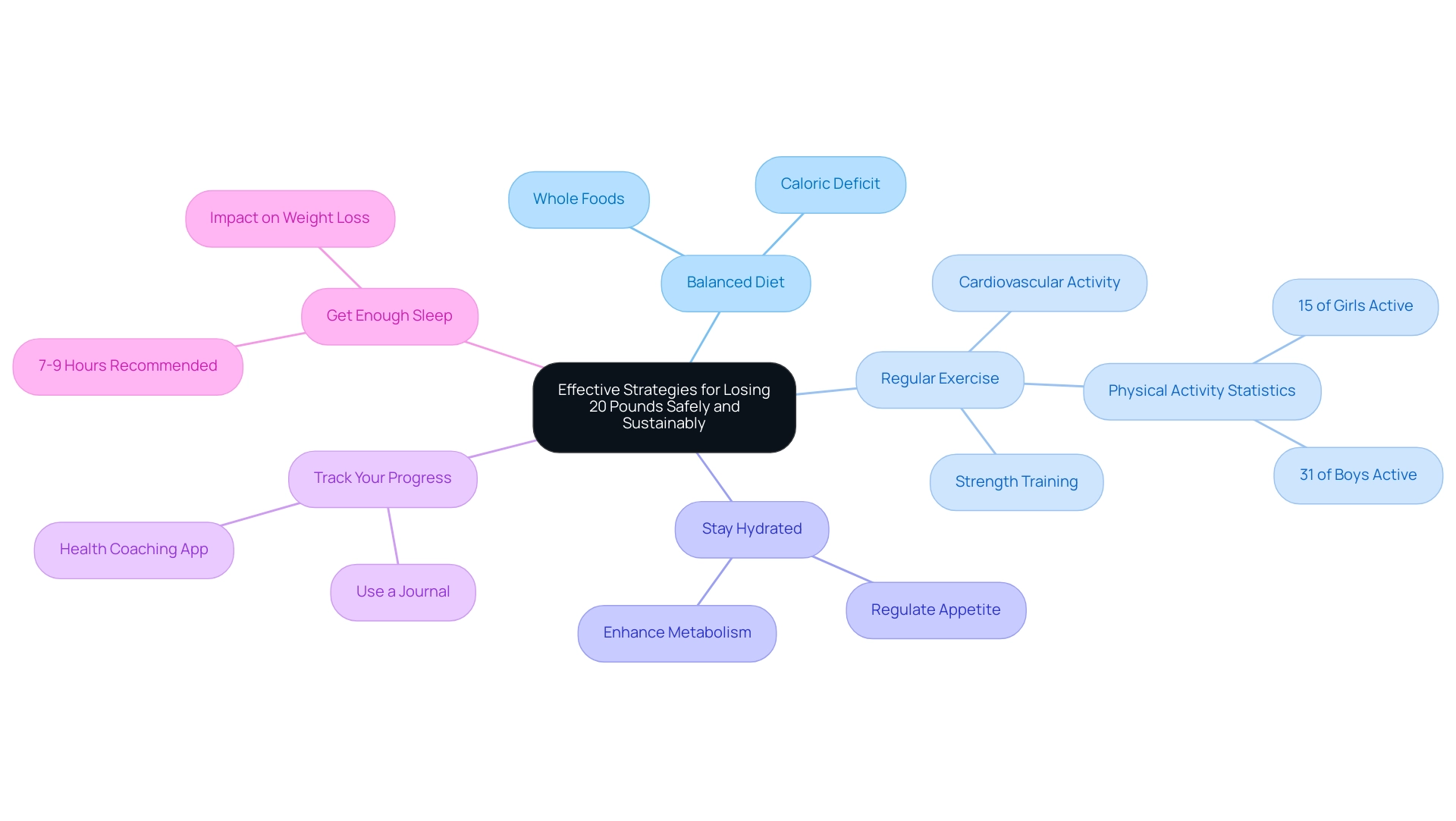
The Psychological Journey of Weight Loss
Starting a body transformation journey involves far more than just physical changes; it intricately includes navigating emotional and psychological challenges. Recognizing that this path will have its highs and lows is crucial for success. To empower yourself and your team on this journey, consider these actionable strategies, supported by personalized coaching and experienced guidance:
- Stay Positive: Celebrate every achievement, regardless of size, and maintain focus on your reasons for pursuing a healthier lifestyle.
- Seek Support: Engage with supportive friends or participate in weight loss groups where experiences, challenges, and victories can be shared.
The Hockey FIT program exemplifies this approach, demonstrating that community-based assistance leads to remarkable outcomes, including a reduction in BMI of −0.9 kg/m² (95% CI −1.4 to −0.4 kg/m²) after 12 weeks, with participants reporting healthier diets and increased physical activity. However, it's important to note that the study's findings may have limitations due to its reliance on electronic medical record data from a single academic system. Moreover, peer assistance initiatives for diabetes management have demonstrated enhancements in health results, further highlighting the significance of aid systems in tackling emotional difficulties during reduction.
- Practice Self-Compassion: Extend kindness to yourself, particularly during setbacks. Remember, fluctuations in progress are a normal part of the journey.
- Visualize Success: Employ visualization methods to vividly picture reaching your fitness objectives. This practice can significantly enhance motivation and commitment.
As highlighted by specialists like Dr. Dina H. Griauzde, examining effective interventions and support systems, such as personalized coaching, can pave the way for not just individual success but also broader population-level reductions in body mass. By gaining knowledge and skills for a healthier life, you can take control of your health and well-being. Embrace these strategies and inspire your team to prioritize their well-being together.
Let's talk about how we can assist your organization in flourishing by applying these tailored coaching methods to reach fitness objectives—get in touch with us today to arrange a consultation!
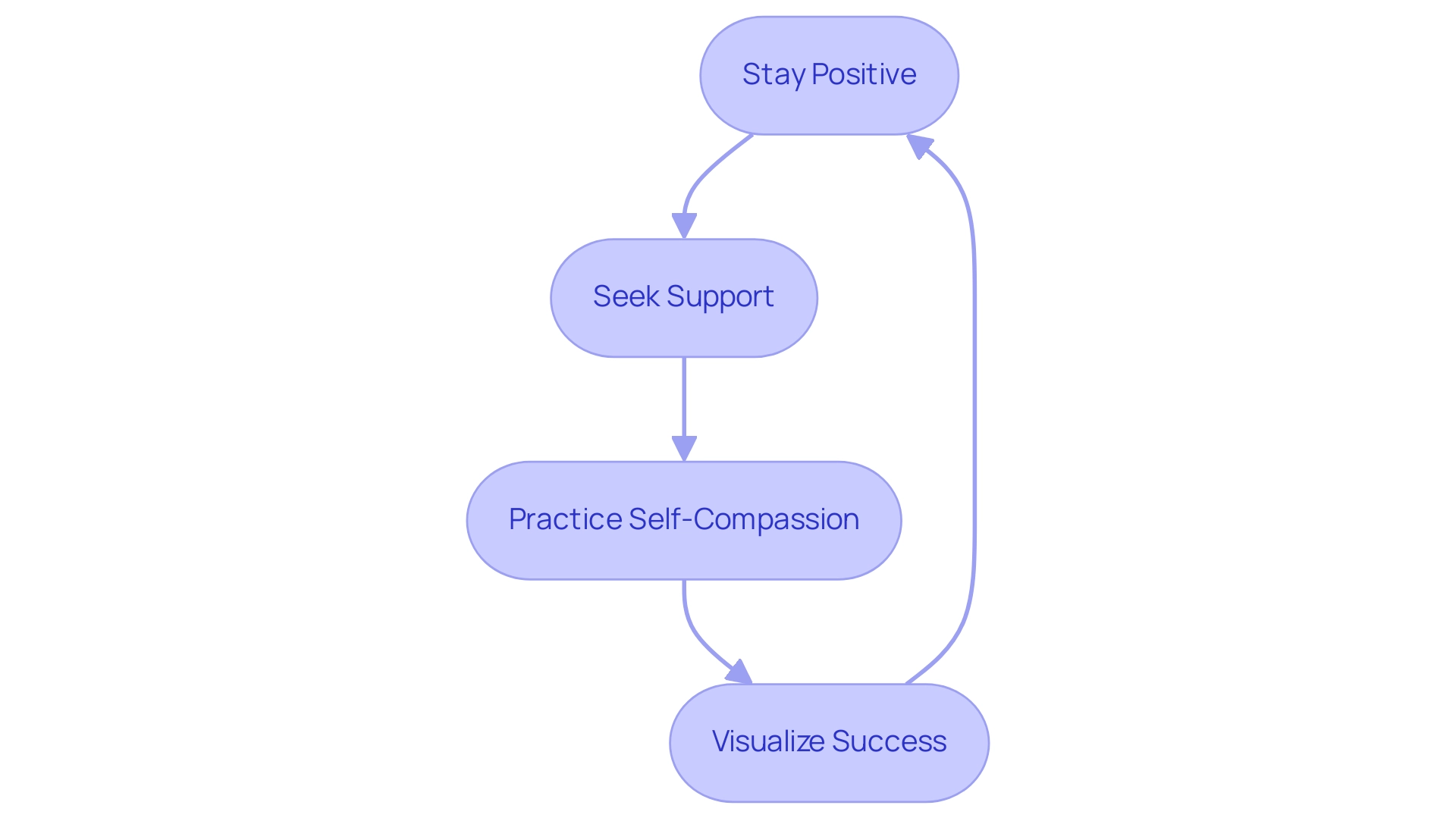
Nutrition: The Foundation of Your Weight Loss Plan
Establishing a solid nutritional foundation is crucial for achieving your weight loss goals, and by focusing on these key strategies, you can set yourself up for success:
- Portion Control: Mindful portion sizes are essential for managing calorie intake effectively. One powerful technique is to use smaller plates and bowls, which can help control portions visually and reduce the temptation to overeat. Research indicates that individuals who practice portion control are more successful in their journey towards reducing body mass. As the quote goes, "Too much of a good thing can be a bad thing," emphasizing the importance of moderation even with healthy foods.
- Balanced Meals: Strive for a harmonious balance of macronutrients in each meal—proteins, fats, and carbohydrates. This approach not only keeps you satisfied but also provides sustained energy throughout the day. For example, consider the Bacon, Avocado & Tomato Egg Mug, which contains 271 calories, 18g of protein, and a nutritious blend of ingredients. In contrast to standard breakfast choices that can surpass 400 calories with reduced protein levels, this meal fits seamlessly with slimming objectives while encouraging fullness.
- Meal Planning: Taking the time to prepare meals in advance can prevent unhealthy last-minute choices. Aim to incorporate a variety of foods to ensure you're getting all the essential nutrients your body needs. The Bacon, Avocado & Tomato Egg Mug serves as a practical example of a portion-controlled meal that encourages healthy eating habits, demonstrating how simple meal planning can lead to better choices.
- Mindful Eating: Cultivating awareness of your hunger cues and eating slowly can significantly enhance your meal experience. This practice not only elevates the enjoyment of your meals but also helps prevent overeating.
By applying these strategies, you will not only promote healthy eating habits but also encourage a mindful approach to managing body composition that can lead to lasting change.
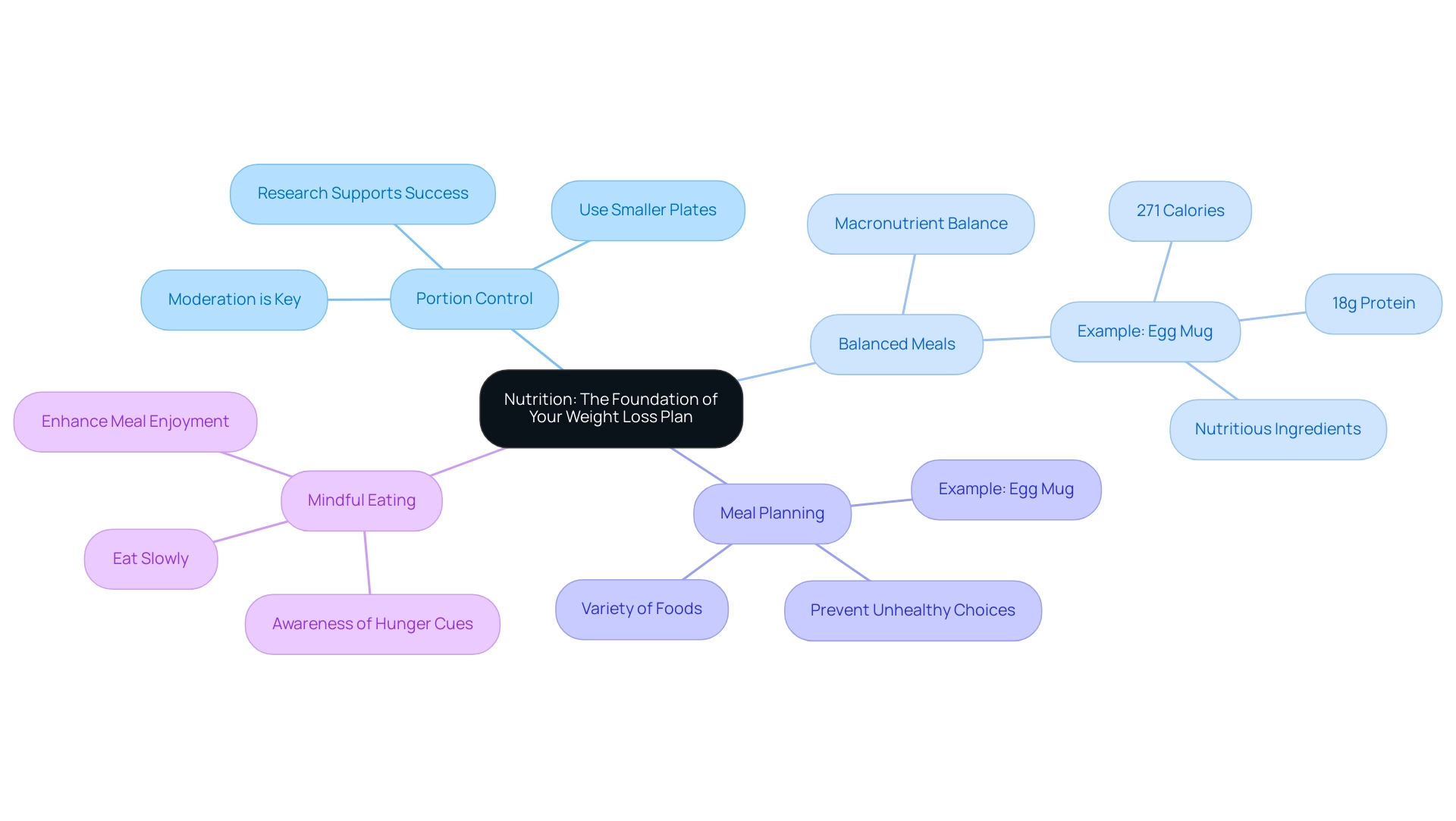
Understanding the Health Benefits of Losing 20 Pounds
Shedding 20 pounds offers numerous advantages for well-being that extend far beyond simple appearance. Here are some key advantages to consider:
-
Improved Heart Health: Significant loss of mass can lead to lower blood pressure and cholesterol levels, markedly reducing the risk of heart disease.
Recent studies have shown that these changes can enhance overall cardiovascular health.
-
Increased Energy Levels: Losing excess mass often results in higher energy levels, making everyday tasks feel less burdensome and allowing for a more active lifestyle.
-
Enhanced Mobility: Reducing weight can relieve pressure on joints, thereby improving mobility and enabling more physical activity, which is crucial for maintaining a healthy lifestyle.
-
Better Mental Health: Research indicates that reducing body mass is linked to enhanced mood and fewer symptoms of anxiety and depression, promoting a more optimistic perspective on life.
-
Lower Risk of Chronic Diseases: Achieving and sustaining a healthy body composition can significantly reduce the risk of chronic conditions such as type 2 diabetes and certain cancers.
Comprehending these advantages is essential—it can act as a strong incentive to remain dedicated to your fitness journey. As Amy Richter, an RD Nutrition expert, emphasizes, "A 2019 systematic review concluded that behavior change techniques such as self-monitoring are essential to sustaining loss." This highlights the importance of accountability throughout this transformative process.
Additionally, a case study titled "Being Accountable" showcased how methods like using food and exercise apps, keeping a food journal, and having an exercise buddy can enhance accountability and ultimately aid in effective weight management.
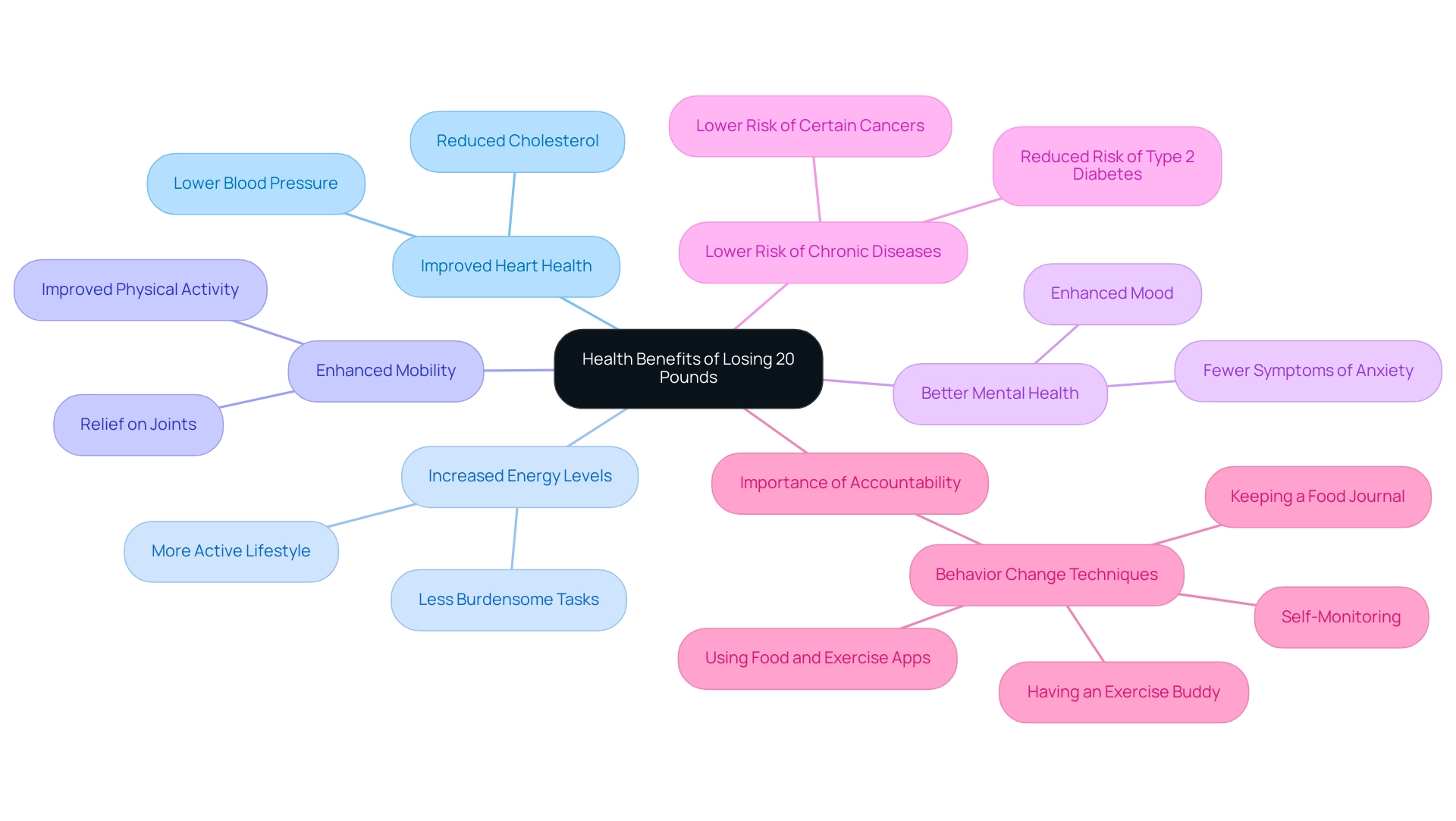
Conclusion
Embrarking on the journey to lose 20 pounds is a commitment that encompasses much more than just physical changes; it intertwines setting realistic goals, adopting effective strategies, and nurturing a positive mindset. By breaking down the weight loss process into manageable milestones, individuals can maintain motivation and celebrate small victories along the way. The emphasis on personalized coaching and support can significantly enhance this experience, ensuring that each step taken is both informed and impactful.
Implementing a balanced diet, regular exercise, and mindful eating practices lays a solid foundation for sustainable weight loss. Staying hydrated and getting adequate sleep are equally vital components that contribute to overall health and well-being. These strategies not only promote effective weight loss but also foster a culture of wellness, encouraging individuals to adopt healthier lifestyles that extend beyond the scale.
The psychological aspects of weight loss—celebrating achievements, seeking support, and practicing self-compassion—are crucial for navigating the emotional ups and downs of this journey. By embracing these strategies, individuals can cultivate resilience and maintain focus on their goals. Ultimately, the health benefits of losing 20 pounds are profound, encompassing improved heart health, increased energy, and enhanced mental well-being.
As the journey unfolds, it becomes clear that prioritizing health and well-being is not just about reaching a number on the scale; it’s about transforming lives. Now is the time to take action, inspire your team, and create a supportive environment that champions lasting change. Together, let’s pave the way for a healthier, happier future.




